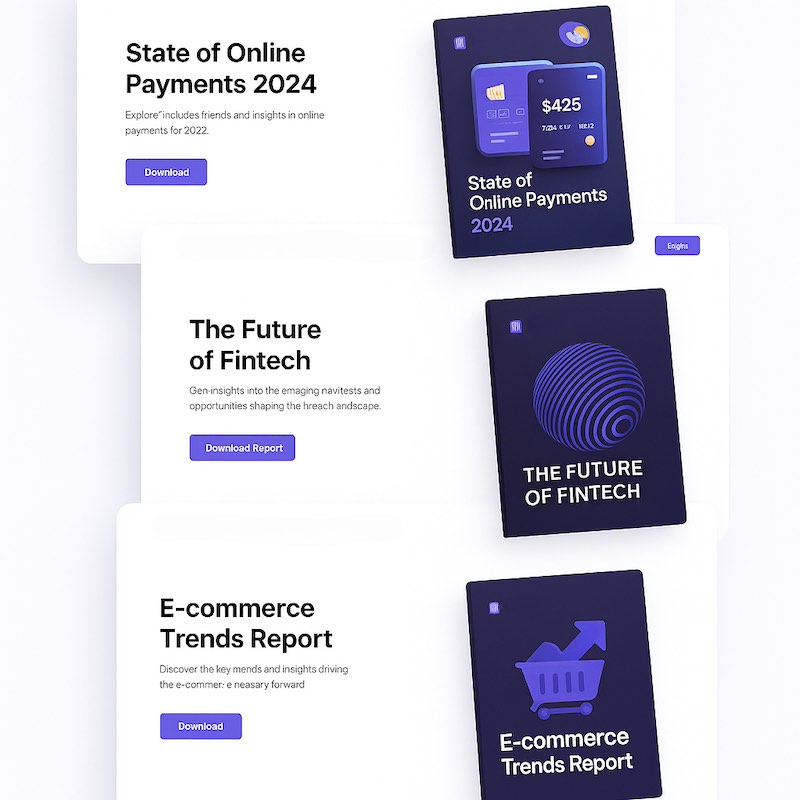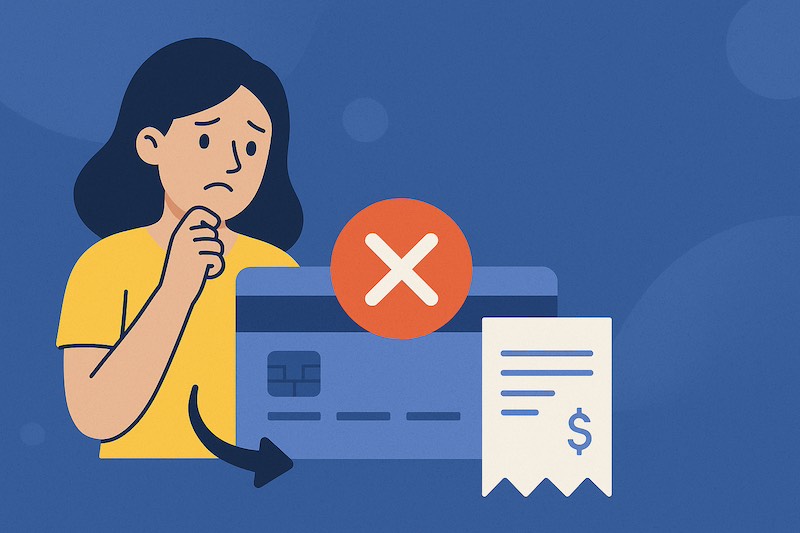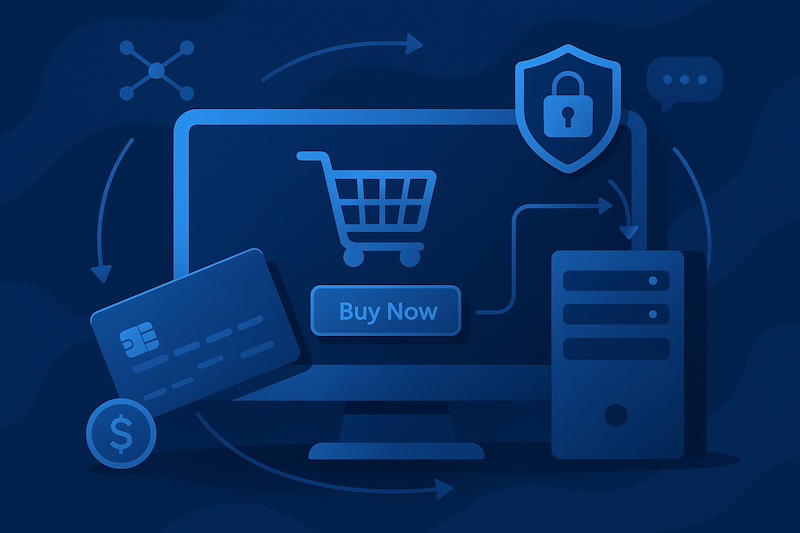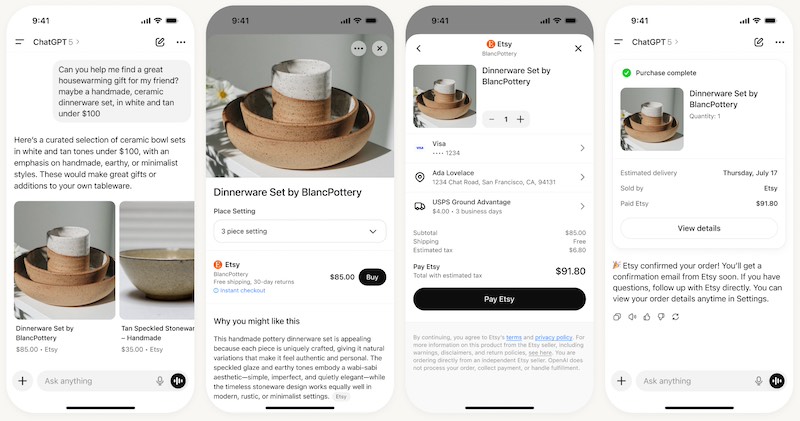Agentic Commerce Protocol (ACP). What it is and how it works: a complete guide

Author
Karol ZielinskiAgentic Commerce Protocol (ACP) is an open communication standard/protocol that enables cooperation between three parties in a shopping scenario: the user (buyer), the AI agent (e.g. ChatGPT), and the merchant/seller and payment system (payment provider / payment gateway). In other words: when a user talks to an AI and wants to buy something, the ACP protocol allows the purchase to be made from a specific merchant and their payment provider.
Idea and technical foundations
Sure, sure. But why was this created in the first place? Traditionally, e-commerce works like this: a user visits a store’s website, browses a product, clicks “add to cart,” pays, and then receives confirmation and delivery.
But what if the entire process could happen directly inside a chat with an AI - no redirects, fewer clicks? That's the idea behind "agentic commerce." ACP was created to provide a technical framework for this type of scenario.
Additionally, the Agentic Commerce Protocol is an open standard (open-source, Apache 2.0 license), which means it's not limited to one company. Any merchant, platform, or payment provider can implement it to participate in commerce directly within an AI chat interface.
If you're interested in the technical aspect of the Agentic Commerce Protocol, you can find the documentation on GitHub here.
How does it work?
Now let's dive into more details.
Key points:
- The merchant provides their product feed to the LLM - the merchant shares a structured catalog of products (JSON, CSV, XML) with key fields: ID, name, description, price, availability, images, variants, delivery options, etc.
- Next comes product discovery by the agent - the user chats with AI ("recommend a travel backpack under $200"), the AI analyzes the intent, searches products from multiple merchants' feeds, selects and ranks them. If a product supports in-chat purchases, the agent can show a "Buy" button.
- The checkout session starts - when the user clicks the buy button, the AI (agent) calls the ACP protocol endpoints in the merchant's system: it creates or updates a checkout session, passes shipping, payment, and delivery info. The merchant responds by accepting or rejecting the order.
- Payment is delegated - since AI cannot store or handle payment instruments directly (for security and regulatory reasons), ACP uses the "Delegated Payment Spec" mechanism. The agent either passes a payment token or collaborates with a PSP (like Stripe), which generates a secure token the merchant uses to charge the customer.
- Then, as usual... shipping, support, returns - all of this remains the merchant's responsibility (the so-called merchant of record). Important: even though AI agents participate in the process, the merchant still handles order fulfillment, delivery, returns, and customer support.
Here's what it looks like in practice with Instant Checkout in ChatGPT:
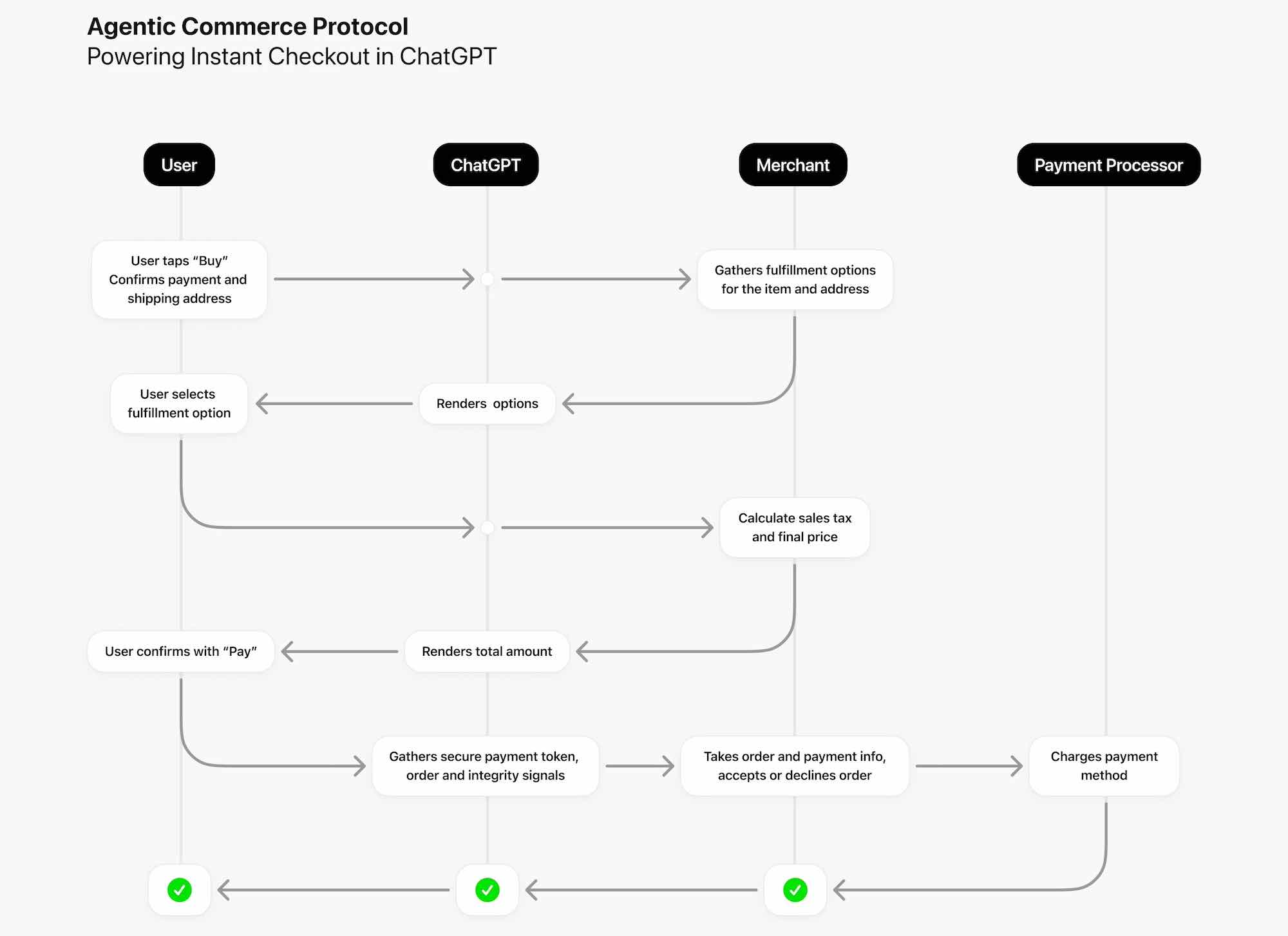
Where is this feature available?
The ACP protocol was announced by OpenAI and Stripe in connection with the "ChatGPT Instant Checkout" feature and is, for now, only available there.
Currently, payments via the Agentic Commerce Protocol in ChatGPT are available only to users in the U.S., who can buy products from selected merchants (mainly from Etsy for now). It has also been announced that the protocol will soon be implemented for merchants on the Shopify platform.
At the same time, merchants and developers have been encouraged to apply and integrate with ACP to become "agent-ready" merchants.
Although the protocol is currently supported only in ChatGPT, by design it operates independently of any specific LLM. This means it could potentially be used across other AI platforms and regions beyond the U.S., though global implementations are still developing.
Why this matters for merchants and the e-commerce market
What the Agentic Commerce Protocol does could become one of the biggest breakthroughs in e-commerce since the invention of the online shopping cart. And it's not just about buying inside ChatGPT. It's about something much bigger: a universal trade language between AI and online stores.
ACP is the first approach that isn't locked into a single ecosystem, platform, or payment processor. It's designed to be neutral and open, meaning any store - whether it runs on Shopify, WooCommerce, Magento, or a custom solution - can connect with any AI agent, not just ChatGPT but also other LLMs in the future.
For merchants, this is a huge shift. Until now, integrations with marketplaces, comparison engines, or sales platforms required individual setups, APIs, and adaptations for each platform. ACP standardizes communication with all available AIs. One protocol - many channels. One integration - many potential sources of sales.
It opens the door to a new generation of conversational commerce, where a customer doesn't need to know your store to make a purchase. They can simply ask any AI assistant for a product, and if your store supports ACP, the AI can immediately offer the option to buy.
The universality of ACP also benefits the entire market. If the protocol becomes widely adopted, everyone wins - small shops, large platforms, payment providers, and even consumers, who will be able to buy anywhere, without friction, redirects, or ten clicks.
It's also worth noting that the protocol's openness (open source) gives the industry something it's long lacked: a shared standard that can accelerate the development of new tools, integrations, and startups around agent-based commerce. This not only simplifies integrations but lays the foundation for entirely new business models and ecosystems around AI-powered payments.
Agentic Commerce Protocol isn't just a way for ChatGPT to sell products. It could become the foundation of a transactional internet where commerce is neutral, open, and accessible from anywhere, through any agent, in any form of interaction.
How to prepare to be agent-ready and use the Agentic Commerce Protocol
If we look at ACP not just as a ChatGPT feature but as a new communication standard between stores, AI agents, and payment systems, then preparing for it really means preparing for the next phase of e-commerce. It's not about another API integration. It's about adapting your store to a world where sales can happen through any assistant, whether text-based, voice, or otherwise.
Here are the key steps to be ready for agent-commerce:
1. Understand what a product feed means in the context of ACP
The foundation of all communication is the product feed - a structured catalog of products (e.g. JSON, XML, CSV). ACP assumes that any AI agent, regardless of platform, can fetch such a feed, understand its structure, and process data in a unified way.
So first, make sure your store can export complete and up-to-date product data that includes:
- a unique identifier (ID),
- name and description,
- price, availability, and currency,
- images and variants,
- delivery and return parameters,
- as well as metadata that helps the agent understand the context (e.g. Q&A, related products).
The richer, cleaner, and more semantic your feed is, the higher the chance an AI agent will properly recognize and recommend your product.
2. Implement ACP-compliant endpoints
ACP defines not only the structure of product data but also how the agent communicates with the store’s system during the purchase process.
To be agent-ready, your store should expose a set of API endpoints compliant with the protocol, including:
- creating a checkout session (purchase initiation),
- updating shipping and payment details,
- confirming or rejecting the order,
- sending order status updates and tracking numbers.
These endpoints allow agents to complete purchases in your store without manual login, form-clicking, or navigating multiple pages.
3. Integrate with a payment system supporting the Agentic Commerce Protocol
Another key component is delegated payment - the method by which the agent passes payment information to the processor without directly handling card data (currently, only cards are supported).
ACP defines a model where the AI agent communicates with the payment processor (gateway) through a secure token. This means:
- the store doesn't receive sensitive data,
- the AI agent doesn’t store cards,
- everything happens through a verified PSP partner.
Currently, Stripe provides the most complete support (as it co-developed the protocol), but the standard is open - any payment institution can implement ACP compliance if it meets security and token format requirements.
4. Prepare your store's operational processes
Being agent-ready isn't only about APIs. It also means operational readiness:
- automatic order confirmation systems,
- real-time inventory updates,
- integration with logistics and shipment tracking,
- and proper customer support workflows (since the AI agent might be the first point of contact for the user).
The key point is that your store must be able to fully process transactions that begin outside your own website. That's the essence of agent-commerce: the user buys anywhere, but you fulfill the order.
5. Compliance testing and certification
ACP is an open standard, but as the ecosystem evolves, certification programs confirming protocol compliance are likely to appear.
It's worth monitoring the official repositories and documentation now, for example:
That way, you can continuously test your implementation and ensure your store remains compatible with key changes to the standard.
6. Think of ACP as a new sales channel, not just a technology
It's worth seeing ACP more broadly - not just as a technical API, but as a future sales channel.
In this world, it won't matter whether the customer is on your website, in a chat, or talking to a voice assistant. If your store supports ACP, an AI agent will be able to place an order on your behalf.
This radically changes how we think about sales, marketing, and product positioning. The future of e-commerce isn't just websites and stores - it's conversational, voice-based, and contextual commerce. ACP is the shared language that ties it all together.
FAQ: common questions about Agentic Commerce Protocol (ACP)
1. Does ACP mean I have to completely change my store’s backend?
Not necessarily. One of ACP's core principles is that merchants can keep their existing payment, fulfillment, and customer service systems. Integration happens through specific endpoints and feeds, without needing to rebuild the entire store.
2. Does ACP only work with Stripe as a payment processor?
Not by design. Stripe is the first and main partner and already offers ready-made tools (like Shared Payment Token) compatible with ACP. However, the specification also allows integration with other PSPs, provided they implement compliant endpoints and tokens.
3. Does using ACP guarantee that my products will rank higher in the chat agent’s results?
There’s no guarantee. Visibility depends on user query relevance, data quality, product availability, price, merchant reputation, and other factors. ACP integration gives access to the channel, not automatic prioritization.
4. Does the user pay more when buying through a chat agent?
Based on available information, the buyer's price remains the same. The merchant still controls pricing and terms, while any channel service fees are charged to the merchant.
5. Does ACP support only physical products, or also services/subscriptions?
The Agentic Commerce Protocol specification allows flexible configurations - for physical goods, digital goods, and subscriptions alike.
6. What if the user wants to buy more than one product (multi-product cart)?
In the first implementation stage (e.g. in ChatGPT), only single-product purchases are supported. However, the roadmap includes expanding to multi-product carts soon.
7. Does ACP work globally?
For now, we can see only one production implementation of the protocol: in the U.S. (in the context of ChatGPT + Instant Checkout). However, ACP itself is a global open standard that can be implemented in any country. Deployment in a specific language, currency, or region depends on the platform and merchants.
8. What if I don’t know how to integrate my store with the Agentic Commerce Protocol?
You contact people who know how to do it and ask for help. Z3x provides such services as part of its fintech consulting and e-commerce advisory.


